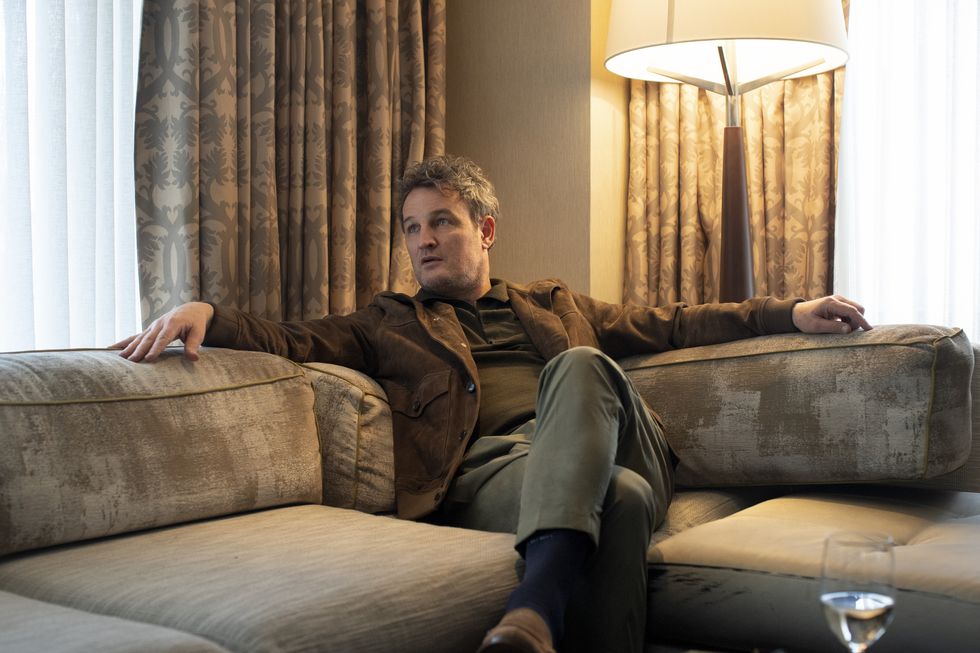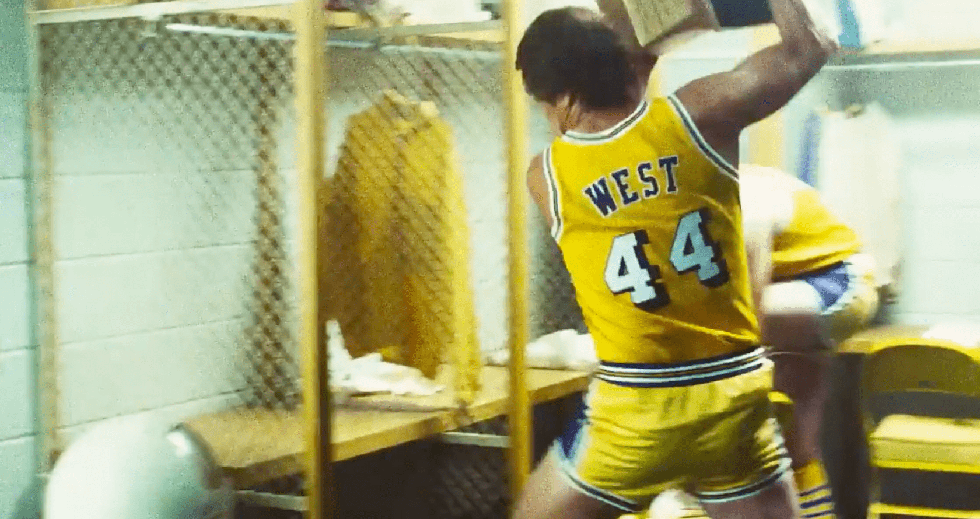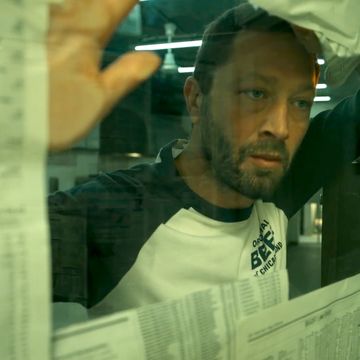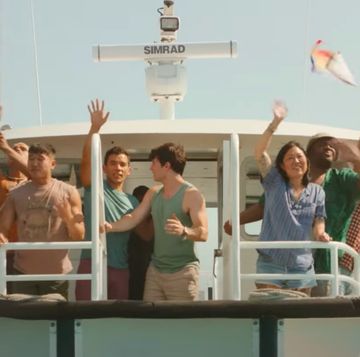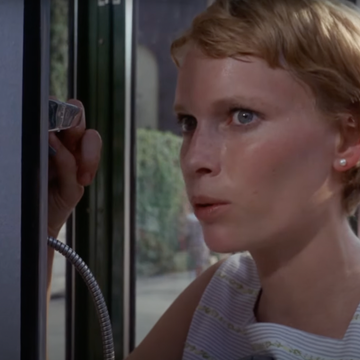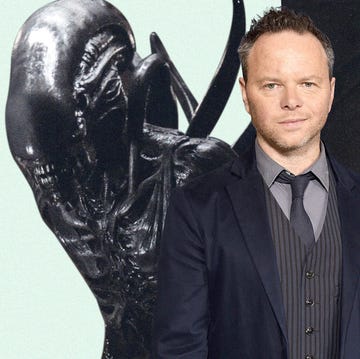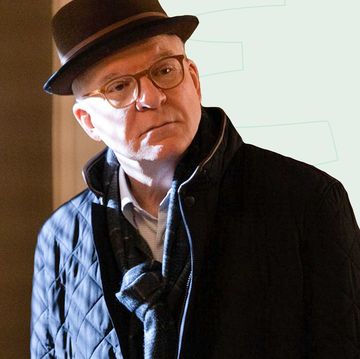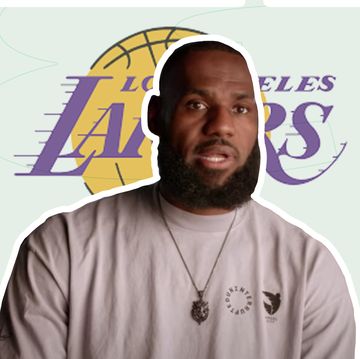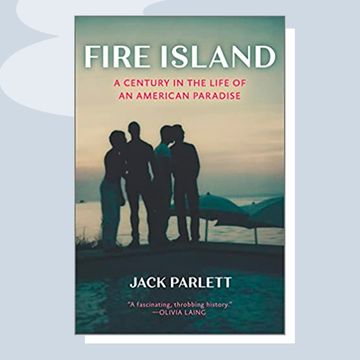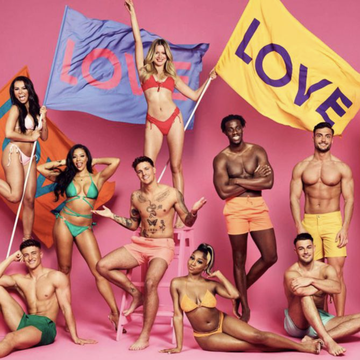At some point during an hour-long conversation with Jason Clarke, days before the premiere of Winning Time: The Rise of the Lakers Dynasty—where he plays hoops legend Jerry West with a manic energy I can only describe as the Incredible Hulk crossed with Porky Pig—it occurs to me that maybe the Australian actor, 52, isn't really here to talk about what it was like squeezing into '60s-era, banana-yellow short shorts. Becoming the man who went to nine NBA Finals and lost eight. Entering the Adam McKayverse.
Maybe, I start to think, he is happy just to chat. To meet a new person, after years of not really being able to do much of that. Every so often, he sips from a little espresso cup. He seems relaxed.
Really, if the names Jerry or West never came up in the conversation, I think he would've been just fine. And as we're about to add a third candle on the pandemic birthday cake, I'm finding this all incredibly endearing.
Clarke is talking about the time he couldn't stop impersonating LEGO Batman during a date with Will Arnett and Taika Waititi. He was shouting, "Eat and weep. Keep eating, keep weeping!" in the middle of the Sunset Tower. ("My wife was kicking me, like, "Jason, enough, enough.") He recommends the 1987 British comedy Withnail & I. ("Fucking watch it straight away.") Anthony Bourdain is on his mind. Just watched Roadrunner. ("He didn't know how to function without an idealism or a romanticism... That hole just gets bigger, I guess.") Clarke asks about my relationship. How close I am to starting a family. He has two young children. ("Take your time. Enjoy yourself first, because it is intense.")
The actor has just returned from a trip to New York, where I live, to promote Winning Time. The trip, he says, "felt a bit sad." First time he's been to the city since hell rained down. Or rose. However that works. The energy was off: empty buildings, a relatively quiet commute into town, the feeling he used to get when he saw the skyline, gone. "It left me feeling very odd," he says. "Is it just the pandemic, or is something going to fundamentally be damaged in us, or changed?"
Sometime after Jason Clarke belts, "JOKER CRASHES THE PARTY. BLACK," but definitely before he imagines out loud what it must be like to lose your arm somewhere near the summit of Mount Everest, he gets to talking about, you know, his career.
Considering the blockbusters he's headlined (Terminator Genisys, Dawn of the Planet of the Apes) and the historical figures he's taken on (Ted Kennedy, The Great Gatsby's George Wilson, who half-counts as a historical figure, right?), it's a wonder that Clarke has managed to maintain such a low profile. He can go from John Connor to Chappaquiddick-era Kennedy, and both ways, he immediately becomes the one person you remember from that thing you just watched. But Clarke isn't on social media. You won't find him in the tabloids. "I'm just a white dude from Australia, the son of a sheep sheerer, and I've been around the world and I've seen a lot of things," he dryly quips of himself at one point.
The closest he's come to Hollywood controversy was the maelstrom surrounding 2012's Zero Dark Thirty. The film, which nabbed five Academy Awards nominations, starred Clarke as a CIA intelligence officer working on the manhunt for Osama bin Laden following 9/11. At the time, critics accused Zero Dark Thirty of taking a pro-torture stance—mainly due to the scene where Clarke's officer uses waterboarding as an interrogation tactic. "I think it's a much-loved film," he says now, as the film nears its 10th anniversary. "And I think rightly so. I think there's just that difference of the broader community and then the film community. What the film community missed was that a topic was taken and put in celluloid before even the writers and the journalists got hold of it and it came out."
As for what comes next, Christopher Nolan recently enlisted the actor in Oppenheimer, his mysterious historical drama about J. Robert Oppenheimer, who was widely considered the father of the atomic bomb. Clarke won't budge when I ask if he can tease his role. Nolan is notoriously secretive when it comes to his projects, so even Clarke, who offers a paragraph or three for every question I lob, slams the brakes. "I'm very, very happy to work with Chris," Clarke says. "I love that he always goes after it and there's intelligence, emotion in there. Out of all his movies, Inception to Tenet, and his Batmans. Memento. I love his Interstellar. He's bold, but connected."
Speaking (again) of the caped crusader, I tell Clarke that I have a date with Battinson right after our call: at a press screening of The Batman.
"In a cinema?" he asks, lighting up.
I'm seeing it at the big Lincoln Square AMC.
"Oh, lovely."
I'm excited.
"I miss that, the big hole."
But because I have a job that I would very much like to keep, I do have to ask Jason Clarke about Winning Time. So he starts teaching me how to swear like Jerry West. Rumor has it, "The Logo" has—or at least, had—a bit of potty mouth. Just know that this isn't coming from Clarke. He has children. This is merely instructional: "Instead of just, oh shit? It'll be, shit fuck! Or, fuck that! It'll be fuck this, fuck this. Oh, fuck you! Fuck that!"
Getting your fucks and shits right is step one in becoming West. The series picks up in 1979, when Jerry Buss buys the Lakers—and immediately finds that West, then the head coach of the team, is the hotheaded roadblock to just about any personnel decision he wants to make. At the time, West was in a crux between his past and future selves: the perennial MVP candidate of his playing days and the legendary executive who traded for Kobe Bryant. Clarke has some fun with West's existential crisis, giving him the scared eyes of an eight-year-old boy who wet the bed. At the same time, he gratuitously pairs those fucks and shits with non sequiturs like, "That shit stays with you like a stink inside of a fuckin' jersey. You let that up in here? You can't wash it out."
I ask Clarke, simply, how he managed not to laugh while screaming things like, "You're fuckin' bustin' my shaft, Pedro!" As he busts the shaft of a golf club in half.
"I was," Clarke says. "I was talking to a guy earlier in the week. And he said, 'He was fucking riding him like a fucking rented mule!' That's right: farmers do ride rented mules pretty hard, because it's not their mule."
I pretend to understand what this means.
"It's like, 'I wish the British burned this fuckhole to the ground!'" (This is something else Clarke says, as West, in Winning Time.) "The anger and the resentment is so deep in him that he's just willing to fucking abuse history to get it across."
You've probably guessed that scenes like, say, West having tantric sex not long after his one Finals win, might piss off a few people. (Especially those who were there: Magic Johnson said he's "not looking forward to it," when asked about the show while Kareem Abdul-Jabbar added that, “the story of the Showtime Lakers is best told by those who actually lived through it.”) Winning Time is content to leave the stat sheets and finer details in the hands of documentarians; instead offering a highly-stylized interpretation of events firmly from the house Adam McKay built. It's cheeky, repeatedly breaks the fourth wall, and has the kind of strip-teasing, five-too-many-drinks flair that ran through the veins Jerry Buss himself. Which is the point!
We'll keep spoilers to a minimum, but later on in Winning Time, Clarke prods at the fallout of West's eight Finals losses—and what falling just short, over and over and over again, did to the man. Having explored that, Clarke says he'd like to meet Jerry West, "but all indications are he is not going to want to watch this or he's not going to be interested in it." West's reputation for a short temper precedes him. You think the man who traded blows with Bill Russell will dutifully watch the HBO show that, one could argue, portrays him like a helicopter parent for 10 weeks?
You might be heartened by this story: Clarke and his Winning Time co-star, John C. Reilly, stopped by a Lakers game last week. You want to guess who walked over to greet them? Owner Jeanie Buss, daughter of Jerry Buss, who gets brought to life by Reilly in the show. "She was lovely, just lovely," Clarke says. "She just couldn't have been nicer. I'm not kidding you. We were very touched. It was very moving. It's her father, you know? I don't think we'll see the likes of him again."
Winning Time has been a welcome change for Clarke, who loves the idea that he could keep playing West in future seasons of Winning Time, as he evolves past the identity crisis we see in Season One. (Eventually, we learn that West's father abused him as a child. In real life, West would later write a stirring memoir, West by West: My Charmed, Tormented Life, which details his upbringing and the depression he faced throughout his life. Clarke has portions of the book underlined.) "I was doing four movies a year to pay my bills, but also because I loved it. Playing four different characters—and I always do quite extreme, different variations—it really upset me. And then to let that character go, when I've got it. So have somebody now that I can go back to Jerry. It's mentally easier. A bit more freeing."
Plus, he's meeting a different crowd while promoting the show: sports journalists. They've been showing up for the Winning Time junkets. Clarke is finding that the writers who sit in press boxes with a notepad are cut differently than the ones who sit in movie theaters with a notepad. "Their knowledge is often deeper of their field than it is for some of these cinema reviewers," Clarke says, adding that he enjoys, "their ability to banter within it rather than classify it."
I tell him that you literally need sharp elbows for that kind of work. If you've spent any time in a locker room after a football game, trying to shove your recorder in front of all the other recorders, just so you can hear a guy mumble, "We fought hard out there today."
"You've got to be careful," Clarke says, totally deadpan. He pauses for dramatic effect. "Or they'll like ride you like a rented mule."

